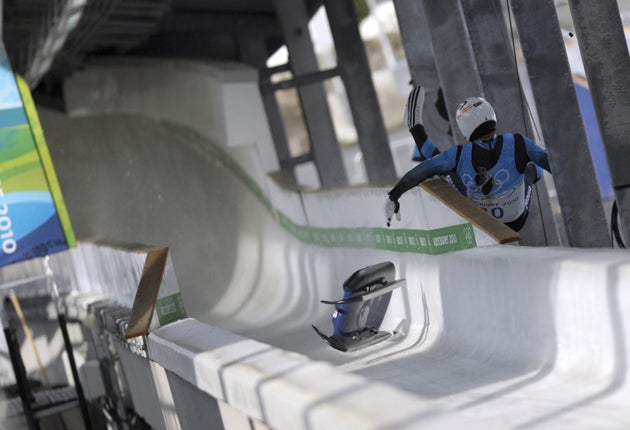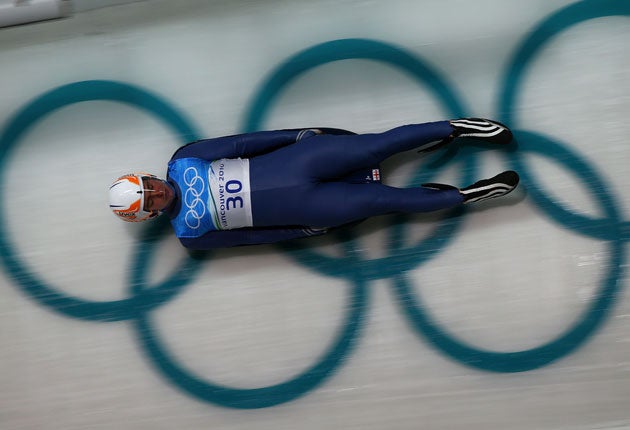His cousin died in a horror luge crash at the Olympics. 12 years on, Saba Kumaritashvili is seeking his own medal
More than a decade after Nodar Kumaritashvili died in a horror luge crash at the Vancouver Olympics, his younger cousin Saba Kumaritashvili plans to finish the race he started, writes Rachel Sharp


When Saba Kumaritashvili takes to the ice in Beijing, his cousin’s presence will no doubt loom large over the race.
The 21-year-old is set to make his Olympic debut in the luge almost exactly 12 years to the day that 21-year-old Nodar Kumaritashvili was killed in a horror crash during his own Olympic debut.
Nodar was participating in a training run on 12 February 2010 just hours before the Winter Olympics Opening Ceremony would get underway in Vancouver.
He was traveling at around 90mph down the Whistler Sliding Centre track when he lost control of his sled on the 16th - and final - curve.
Nodar was thrown from the sled feet first and sent flying over the ice wall where he plowed head-on into an exposed metal post.
A coroner later ruled that he died instantly on impact.
Nodar’s sled continued down to the finish line and stopped the timer as it crossed.
Now, more than a decade on, Saba hopes to finish the race his cousin started and take home a medal for their home country of Georgia in the 2022 Beijing Winter Olympics.
Saba said in a recent interview with the Associated Press that he can feel Nodar’s “strength” with him as he heads to the Games.
“Thinking about him is painful but gives me strength as well,” he said.
“Every generation of our family had at least one luge sportsman, and now my father and I are continuing this tradition and following Nodar’s footsteps.”
The 21-year-old got into the sport at a young age and made his debut competition just last year in the 2021 Nations Cup in Sigulda.
According to his bio page on the Beijing 2022 website, Saba is 47th in the World Cup rankings.
It seems there was never any doubt that Saba would persevere with the sport even in the face of unspeakable tragedy.

Saba and Nodar both come from a long line of lugers.
It was Aleko Kumaritashvili, Saba’s great-grandfather, who introduced the sport to the country of Georgia back in the 1970s and built its first luge track in the family’s hometown of Bakuriani’s in 1973.
“My great-grandfather laid the foundation for this sport” and went on to become its national coach, Saba told AP.
The passion for luging then continued through the generations.
Saba’s grandfather Felix and uncle David (Nodar’s father) were both several-time champion lugers when Georgia was part of the Soviet Union.
At one point, Felix was the coach for the French National Luge Team before becoming the president of Georgia’s national luge federation and its national coach, according to an online obituary.
Felix coached many luge athletes during his career, including Nodar at the time of his fatal crash.
Saba’s father is now president of the national federation following Felix’s death in 2020.
Despite their multi-generational success in the sport, it wasn’t until 2010 when Nodar became the first in the family to head to the Olympic Games.
After his cousin’s dreams were cut short in the training rounds, Saba will now become the first to compete for a medal.

Even after Nodar’s death, the family were determined not to hang up their sleds.
In an interview in 2014 - four years on from his son’s death - his father David spoke of his plans for his 18-month-old grandson Nikayo to “continue our luging dynasty”.
“At three we’ll start training him,” he said at the time.
Erin Hamlin, the first singles slider ever to win an Olympic medal in luge for Team USA, told The Independent she isn’t surprised to see Nodar’s cousin continuing the family tradition even in light of his death.
“I don’t think it’s surprising,” she said. “The family has a lot of connection to the sport.”
It was Ms Hamlin’s second Olympic Games in Vancouver when the luge community was rocked by Nodar’s horrific crash.
His death made him the first athlete to die in Olympic training or competition in almost half a century after luger Kazimierz Kay-Skrzypecki died in a crash during practice in the 1964 Games.
Ms Hamlin said “there was a lot of shock” at Nodar’s death but says it never even crossed her mind to pull out of the competition.
“Obviously it shook us all. You never want to see something like that happen,” she said.
“But I was never in a mindset that I wouldn’t compete. I was comfortable on the track.”
The same mentality appears to be true of Saba.
Ms Hamlin added: “There’s risks every time you slide. I was never fearful about continuing to slide.
“The track was definitely fast and challenging but it was new and most new tracks are challenging to figure out and come with risk. I enjoyed the track quite a bit.”
Questions were instantly raised after Nodar’s death about the safety of the track.
The Whistler course was the fastest track in Olympic history and speeds of 96 miles per hour had been recorded ahead of the Games.
The 16th curve where Nodar had flown off the track had earned the nickname the “Thunderbird”.
David revealed that his son had told him just three days before his death that he was “very scared” of the turn where he flipped off the sled.
“Dad, I’m very scared of this spot on the track,” he recalled to ABC News.
“It’s very, very fast. But don’t worry, I’ll handle it well.”
David said he urged him not to “risk it” but that his son was insistent that he was going to go for it.
“What will be, will be,” he recalled him saying.

It was Nodar’s fifth and final training run before he would have competed in the Games the following day when tragedy struck.
The track was hurriedly altered following the crash in time for the first race less than 24 hours later.
The start was lowered in an effort to reduce the speed.
The exposed metal poles which Nodar struck were covered with a 12-foot-high wall made of wood and padding.
And the Thunderbird was reconfigured so that the sleds didn’t slide too high on the walls.
International Luge Federation officials said at the time that the changes were made with the “emotional component” of the athletes in mind and insisted that there were no “deficiencies in the track”.
Instead, they said that the crash was caused by errors made by Nodar when he “did not compensate properly to make correct entrance into Curve 16”.
For several athletes, the last-minute change in start proved difficult.
Ms Hamlin had been expected to take home at least bronze but ended up missing out on the medal table. She won bronze four years later in Sochi.
She told The Independent that Nodar’s death did lead to changes in the sport in terms of focusing on safety over speed.
“I think it was a movement where everyone stopped to look at ways we could try to see if it was possible to make the track safer,” she said.
“There wasn’t much that could be done other than moving the starts as it was kind of a freak accident.
“But the trend of just building faster and faster tracks did change.”

For Saba, he feels he is now ready to represent his family - particularly his cousin - in Beijing.
“I worked hard and believed in myself strongly,” he said.
“Now I feel happy and satisfied that I’ve achieved one of my goals… I think every sportsman’s goal and dream is to be competing in the Olympic Games, so two years ago I decided to achieve this goal. And here I am.”
He added: “I am happy and proud that I have the opportunity to represent my family and country at these Olympics.
“Now I feel responsibility to them, because they expect good results from me. It’s really big motivation, so I will try to do my best for them.”
Join our commenting forum
Join thought-provoking conversations, follow other Independent readers and see their replies
Comments



Bookmark popover
Removed from bookmarks